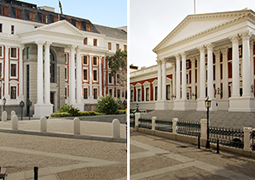
Political parties deployed the least experience representatives to the local sphere of government, the Conference on State Capability hosted by Parliament has heard. The Minister of Cooperative Governance Dr Nkosazana Dlamini-Zuma told the conference that municipalities are a battle ground in South Africa’s developmental state.
Dr Dlamini-Zuma said people’s patience with municipalities has waned, as evidenced by the declining voter numbers participating in the recent local elections. “Voter turnout is one indicator of a capable state and low turnouts signalled the deep problems democracies face today. The masses are losing hope in democracies; the local sphere is a battle ground.”
Challenges include the fact that political parties send their least experience people to local government. The local government sphere is also the least-resourced in terms of skills and financial resources.
With the theme “State Capability: Delineating Weaknesses, Devising Strategic Mechanisms to Accelerate Policy Implementation”, the conference was held virtually and was attended by Cabinet ministers, members of provincial legislatures, academics and councillors.
Dr Dlamini-Zuma said many municipalities have administrative challenges. “This is an issue even in the economy; the skills revolution needs to be implemented. But also at the root of the problems at local government is the political instability and the lack of economic development.”
She identified other challenges as high turnover of councillors, rural municipalities that lack revenue, corruption and low revenue collection. “The time for action is now. We must reposition ourselves to meet the demands of active citizenry.” She said the department has started working with academic institutions.
Dr Xolisile Ngumbela, School of Public Management, Governance and Public Policy, College of Business and Economics, University of Johannesburg, said the state’s failure to invest in rural development will result in people leaving for towns. “Rural municipalities are unable to generate revenue for the local folks. Even municipal managers, most of them do not stay in their municipalities. The retention of skills and political interference is rife.”
He said for anyone to survive as municipal managers, they have to hide behind councillors, who he described as a law unto themselves in municipalities. “The state wishes to attract public value and trust, but fails to capacitate civil servants in order to deliver on their mandate. Developmental state requires investments.”
He said service delivery is a basic human right and that services need to be provided impartially, fairly and without bias. Dr Ngumbela also highlighted that SOEs compete with government departments. “Even when they spend on non-core functions, it’s like they are not from SA and do not know how the financial systems work.” He added that the government’s programme monitoring system needs to be strengthened so that adhere to the principles of a developmental state.

